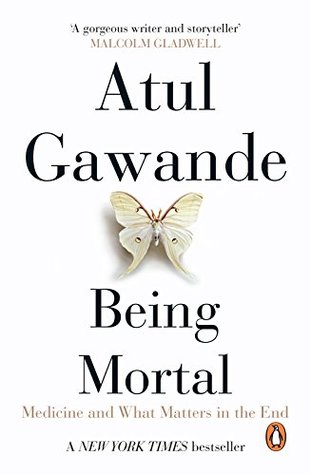More on this book
Community
Kindle Notes & Highlights
“What tormented Ivan Ilyich most,” Tolstoy writes, “was the deception, the lie, which for some reason they all accepted, that he was not dying but was simply ill, and he only need keep quiet and undergo a treatment and then something very good would result.”
Death, of course, is not a failure. Death is normal. Death may be the enemy, but it is also the natural order of things. I knew these truths abstractly, but I didn’t know them concretely—that they could be truths not just for everyone but also for this person right in front of me, for this person I was responsible for.
“The necessity of nature’s final victory was expected and accepted in generations before our own. Doctors were far more willing to recognize the signs of defeat and far less arrogant about denying them.”
For a clinician, therefore, nothing is more threatening to who you think you are than a patient with a problem you cannot solve.
There’s no escaping the tragedy of life, which is that we are all aging from the day we are born. One may
even come to understand and accep...
This highlight has been truncated due to consecutive passage length restrictions.
I am in a profession that has succeeded because of its ability to fix. If your problem is fixable, we know just what to do. But if it’s not? The fact that we have had no adequate answers to this question is troubling and has caused callousness, inhumanity, and extraordinary suffering.
THIS IS A book about the modern experience of mortality—about what it’s like to be creatures who age and die, how medicine has changed the experience and how it hasn’t, where our ideas about how to deal with our finitude have got the reality wrong. As I pass a decade
Lacking a coherent view of how people might live successfully all the way to their very end, we have allowed our fates to be controlled by the imperatives of medicine, technology, and strangers.
But one thing he could never get used to was how we treat our old and frail—leaving them to a life alone or isolating them in a series of anonymous facilities, their last conscious moments spent with nurses
and doctors who barely knew their names. Nothing could have been more different from the world he had grown up in.
If you cannot, without assistance, use the toilet, eat, dress, bathe, groom, get out of bed, get out of a chair, and walk—the eight “Activities of Daily Living”—then you lack the capacity for basic physical independence.
If you cannot shop for yourself, prepare
your own food, maintain your housekeeping, do your laundry, manage your medications, make phone calls, travel on your own, and handle your finances—the eight “Independent Activities of Daily Living”—...
This highlight has been truncated due to consecutive passage length restrictions.
He emphasized education, hard work, frugality, earning your own way, staying true to your word, and holding others strictly accountable for doing the same. Throughout his life, he awoke before sunrise and did not go to bed until he’d done a nighttime inspection of every acre of his fields by horse. Even when he was a hundred he would insist on doing this. My uncles were worried he’d fall—he was weak and unsteady—but they knew it was important to him. So they got him a smaller horse and made sure that someone always accompanied him. He made the rounds of his fields right up to the year he died.
As he became successful, he sent ever larger amounts of money home, helping to build new houses for his father and siblings, bring clean water and telephones to the village, and install irrigation systems that ensured harvests when the rainy seasons were bad.
THE FASCINATING THING is that, over time, it doesn’t seem that the elderly have been especially sorry to see the children go. Historians find that the elderly of the industrial era did not suffer economically and were not
unhappy to be left on their own. Instead, with growing economies, a shift in the pattern of property ownership occurred. As children departed home for opportunities elsewhere, parents who lived long lives found they could rent or even sell their land instead of handing it down. Rising incomes, and then pension systems, enabled more and more people to accumulate savings and property, allowing them to maintain economic control of their lives in old age and freeing them from the need to work until death or total disability. The radical concept of “retirement” started to take shape.
“intimacy at a distance.”
The veneration of elders may be gone, but not because it has been replaced by veneration of youth. It’s been replaced by veneration of the Independent self.
THERE REMAINS ONE problem with this way of living. Our reverence for independence takes no account of the reality of what happens in life: sooner or later, independence will become impossible. Serious illness or infirmity will strike. It is as inevitable as sunset. And then a new question arises: If independence is what we live for, what do we do when it can no longer be sustained?


